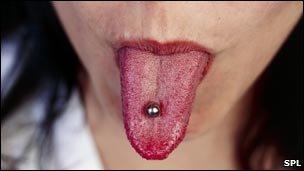Tongue piercings 'can cause damage to teeth'
- Published

Wearing tongue studs has even been linked to brain abscesses
People with tongue piercings risk developing gaps between their front teeth as a result of playing with the stud, US researchers have found.
The University of Buffalo team says that, as well as potentially requiring cosmetic work, people can develop infections and chipped teeth.
It discusses a patient in the Journal of Clinical Orthodontics who needed braces to correct the gap in her teeth.
UK experts advised people to "steer clear" of the adornment.
The researchers said that people with tongue piercings were likely to push the metal stud up against their teeth and consequently cause gaps and other problems to arise.
Sawsan Tabbaa, professor of orthodontics at the University of Buffalo, detailed the 26-year-old's case.
She had had no space between her teeth before wearing a barbell-shaped tongue stud.
However, a space had appeared between her upper front teeth over the course of the seven years she had worn it for, because the metal bar was pushed against and between the teeth.
Temptation
Professor Tabbaa said: "The barbell is never removed because the tongue is so vascular that leaving the stud out can result in healing of the opening in the tongue, so it makes perfect sense that constant pushing of the stud against the teeth - every day with no break - will move them or drive them apart.
The author concluded that tongue piercings could result in serious injuries, not just to teeth. Piercings have also been associated with haemorrhages, infections, trauma to the gums and, in the worst cases, brain abscesses.
Dr Nigel Carter, chief executive of the British Dental Health Foundation, said: "The temptation of playing with the stud in the mouth would be very high and in time this could lead to hundreds of pounds worth of corrective treatment.
"The results of this study stress the risks.
"In order to avoid such health problems in the future, along with the spiralling costs of any related treatment, I would advise people to stay clear of tongue piercings."